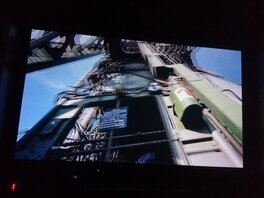3D stereoscopic playback is broken on multiple platforms
Terms used:
HOU = Half Over/Under
2D = Monoscopic mode, only a single full-screen frame, like an normal movie.
2D HOU = The image top and bottom halfs each represent a frame for right and left eye when converted to 3D mode by the TV. The two frames are half the original height.
3D = The resulting full-screen 3D image generated by the TV from a 2D HOU source.
Test video used:
3D HOU, 1920x1080p, 23.976fps, h264 high L4.1, yuv 4:2:0, Matroshka container, downloaded from a torrent.
Raspberry Pi 4, HDMI, Panasonic P50ST60 (plasma 3D TV), Panasonic 3D shutter glasses
LibreELEC v9.2.7
- Kodi interface in "3D" mode (sent to TV as 2D HOU)
TV detects 3D image and activates 3D glasses. The interface appears as 3D. Menus and popups have "depth". 
- 3D video playback in 2D mode (3D disabled in Kodi)
The video is sent to the TV unmodified, as 2D HOU.
When the video is full-screen without subtitles or any Kodi interface visible, the TV detects the 2D HOU video as a 3D source and activates 3D glasses.  Notice the double edges in the image below. When viewed through 3D glasses, this image appears 3D.
Notice the double edges in the image below. When viewed through 3D glasses, this image appears 3D.

When there are subtitles or Kodi menus visible, TV exits 3D mode and the image appears again as 2D HOU. This is expected, but  because 3D mode doesn't work.
because 3D mode doesn't work.

- 3D video playback in 3D mode
The menus are sent to the TV in the expected mode (2D HOU), but the video appears as normal 2D. It is not 2D HOU. Only one frame is visible and that frame (left eye or right eye - I don't know) is shown full-screen. 

 The TV doesn't detect 3D (because there is none).
The TV doesn't detect 3D (because there is none).


Disabling acceleration (MMAL) doesn't change anything.
Tinker Board S (Rockchip RK3288), HDMI, Panasonic P42ST60, Panasonic 3D shutter glasses
LibreELEC v10 beta 4
- Kodi interface in "3D" mode (sent to TV as 2D HOU) works fine, same as Raspberry Pi. 
- 3D video playback in 2D mode (3D disabled in Kodi)
The video is sent to the TV unmodified, as 2D HOU. Menus and subtitles break the TV's 3D mode, same as Raspberry Pi.

- 3D video playback in 3D mode
Things get really crazy here. The Kodi menus appear fine, as 2D HOU, but the video is Quarter-size Over/Under.  See photo. Top half of the image consists of both left eye and right eye frames (quarter-height each), while the bottom half is black.
See photo. Top half of the image consists of both left eye and right eye frames (quarter-height each), while the bottom half is black.


If I disable acceleration ("DRM PRIME"), things get even more crazy. There are now 4 frames on the screen! 


I am available for more tests if needed.
I really hope this is not a kernel issue!

